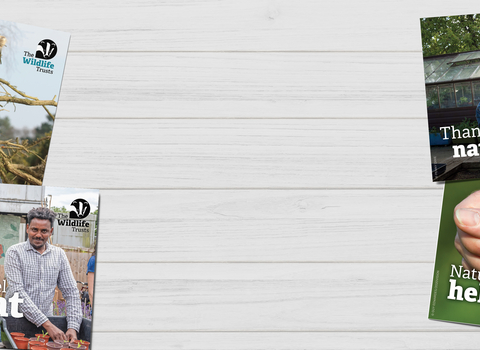A major evaluation of a green prescribing for mental health pilot programme in England has been published (find the report here: Preventing and Tackling Mental Ill Health through Green Social Prescribing). The seven green prescribing pilots began in 2020 – each with involvement from the local Wildlife Trust. Over 8,000 people took part, with 57% coming from the most economically under-served places. The programme also had a strong outreach in terms of ethnic diversity, with 21% of people coming from ethnic minority communities.
The report has some eye-catching findings:
-
There were big reductions in anxiety and depression symptoms, and significant improvements across well-being measures*, with big increases in happiness and life satisfaction, alongside an increase in people’s feeling that “life is worthwhile”
-
In terms of the pounds and pence, there was a return on investment of £2.42 per £1 invested by HM Treasury. Social prescribing generates economic return. It also compares well with other NHS interventions if looking through a cost-effective lens. The cost of a green prescription was about £500. Comparatively, cognitive behavioural therapy costs about £1,000 for 10 sessions.
And it seems that HM Treasury are also convinced by this UK Government commissioned report, as they have already invested a further £2.3 million in the pilot programme, taking it to March 2025.
This chimes with economic analysis that The Wildlife Trusts published in July 2023: A Natural Health Service: Improving Lives and Saving Money. Health economists at Ricardo Energy & Environment and The Institute of Occupational Medicine reviewed five Wildlife Trust’s programmes and found that they save the NHS money and cut reliance on their resources. Also, that there are much greater cost savings to be had if these programmes were delivered at scale in the UK.
For example: Wild at Heart run by Sheffield and Rotherham Wildlife Trust generated cost savings to the NHS of £38,646 based on 82 participants over a year. If this programme were delivered at greater scale – to 1.2 million people, the study found it could result in annual cost savings of £635.6 million, for an investment of £534 million.
£100 million cost saving with 1.2 million people’s health and well-being improved. What’s not to like?
As the authors put it: “It’s clear from our results that green prescribing has the potential to deliver cost saving benefits to the NHS and ‘take weight out of the system”.
And that’s what this is ultimately about. By supporting more people to benefit from nature, we can prevent unnecessary illness, improve people’s well-being and help the NHS focus on what it needs to do. There is also a sustainable funding solution, where the new UK Government can show some leadership, and ‘invest to save’.
It is time to commit to ‘shared investment’ funds that support community-based health services across the nature, arts and physical activity sectors. Policies that enable this shared investment from government departments overseeing housing, employment, community cohesion, transport and culture means the costs – and the benefits – are shared. This national investment would create the ‘engine room’ for community-based health services and enable private, public and philanthropic investment at a local level.
Appropriately, the final word goes to health inequalities guru and UK Government advisor, Professor Sir Michael Marmot, who says:
If Wildlife Trusts programmes like those described in this research were made available to more people in more places, they could help prevent unnecessary ill-health and reduce the number of people requiring NHS services.
This ‘Natural Health Service’ alongside the creation of natural spaces in communities across the country will help bring about healthy and sustainable places to live and work.
It’s time to make this happen!


